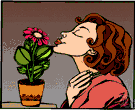smell
(smĕl)These nouns denote a quality that can be perceived by the olfactory sense: the smell of smoke; the aroma of frying onions; hospital odors; the scent of pine needles.
smell
(smɛl)smell
(smɛl)v. smelled smelt, smell•ing, v.t.
Smell
- The air smelled like damp flannel —Jonathan Kellerman
- The air smelled … like the interior of the Bastille in 1760 —Carlos Baker
- As malodorous as a badly ventilated lion house in a zoo —John Cheever
- A close antiseptic odor like an empty schoolroom —George Garrett
- A dark wet smell like a cave —Pat Conroy
- He smelled like something that spent the winter in a cave —Sue Grafton
- It [a hotel lobby] smelled like fifty million dead cigars —J. D. Salinger
- A kitchen odor hung about like a bad mood —Tom Maclntyre
- The lingering odor of sweat like sour wheat —Louise Erdrich
- (He gave off an) odor like a neglected gym locker —Wallace Stegner
- The odor of her body, like salted flowers —Bernard Malamud
- The odor (of newly turned earth) steamed up around him like incense —Dorothy Canfield Fisher
- The office smelled like hot coffee —Richard Ford
- An old man smells old … like old clothes that need an airing —Saul Bellow
- The place smells like a wrestler’s armpit —Jilly Cooper
- Pleasantly pungent, like the smell of one’s own body —John Updike
- Reek like last week’s fish —Mike Sommer
- The scent [from garden] rises like heat from a body —Margaret Atwood
- Scent rising like incense (from the cleavage of her splendid bosom) —Jilly Cooper
- The sea smelled like a sail whose billows had caught up water, salt, and a cold sun —Robert Goddard
- Sexual smells, like the odor of an excellent cheese, are considered foul by those who experienced them without their appetites being involved —Judith Martin
- A smell [of cheap cologne] like rotten bananas in a straw basket —Jonathan Valin
- [Hallway of a hotel] smelled like hot bread and clean laundry —Richard Ford
- Smelled like something the cat dragged in —American colloquialism
- (Mrs. Lamb) smelled like spoiled lilacs —Richard Ford
- [A boy] smelled like the bottom of a calf pen where the piss settled and burned the yellow straw red and when you turned the straw over with a fork the ammonia smell made your eyes water —Will Weaver
- Smell fresh as apples —John Braine
- (Soft-spoken women) smelling like washed babies —Philip Levine
- Smell like an open drain —Louis MacNeice
- Smell like a sick skunk —Elmer Kelton
- The smell of moist earth and lilacs hung in the air like wisps of the past and hints of the future —Margaret Millar
- Smells like the underneath of a car —Carolyn Chute
- Smells badly like things that have been too long dead —Donald McCaig
- Smells fresh as melting snow —W. P. Kinsella
- Smell stronger than a ton of rotten mangoes —Hunter S. Thompson
- Smell (of carnations) … thick as smoke in the sun —Mary Stewart
- [Honeysuckle smell] smothering, like an anesthetic —Lynne Sharon Schwartz
- A stale smell like a bad embalming job —Jimmy Sangster
- (The married man is grateful for) the stuffy room that smells of his wife like a bar smells of beer —David Denby
- There was a foul reek of something fecund and feline, like the stench of old lion spore upon the veldt —Tama Janowitz
- Wet fields reek like some long empty church —John Betjeman
smell
Smell can be a noun or a verb. The past tense and -ed participle of the verb is smelled, but smelt is also used in British English.
The smell of something is a quality it has that you are aware of through your nose.
If you say that something smells, you mean that people are aware of it because of its unpleasant smell.
You can say that a place or object smells of a particular thing, which can be pleasant or unpleasant.
Be Careful!
You must use of in sentences like these. Don't say 'The house smelled freshly baked bread'.
You can say that one place or thing smells like another thing, which can be pleasant or unpleasant.
You can also use smell with an adjective to say that something has a pleasant or unpleasant smell.
Be Careful!
Don't use an adverb after smell. Don't say, for example, 'It smells deliciously'.
If you can smell something, you are aware of it through your nose.
Be Careful!
You usually use can or could in sentences like these. You usually say, for example, 'I can smell gas' rather than 'I smell gas'. Don't use a progressive form. Don't say 'I am smelling gas'.
smell
Past participle: smelled/smelt
Gerund: smelling
| Imperative |
|---|
| smell |
| smell |
| Noun | 1. |  smell - the sensation that results when olfactory receptors in the nose are stimulated by particular chemicals in gaseous form; "she loved the smell of roses" smell - the sensation that results when olfactory receptors in the nose are stimulated by particular chemicals in gaseous form; "she loved the smell of roses"aesthesis, esthesis, sensation, sense datum, sense experience, sense impression - an unelaborated elementary awareness of stimulation; "a sensation of touch" scent - an odor left in passing by which a person or animal can be traced fetor, foetor, malodor, malodour, reek, stench, stink, mephitis - a distinctive odor that is offensively unpleasant acridity - having an acrid smell |
| 2. |  smell - any property detected by the olfactory system smell - any property detected by the olfactory systemproperty - a basic or essential attribute shared by all members of a class; "a study of the physical properties of atomic particles" fetidness, malodorousness, stinkiness, rankness, foulness - the attribute of having a strong offensive smell muskiness - having the olfactory properties of musk rancidness - the property of being rancid | |
| 3. |  smell - the general atmosphere of a place or situation and the effect that it has on people; "the feel of the city excited him"; "a clergyman improved the tone of the meeting"; "it had the smell of treason" smell - the general atmosphere of a place or situation and the effect that it has on people; "the feel of the city excited him"; "a clergyman improved the tone of the meeting"; "it had the smell of treason"ambiance, ambience, atmosphere - a particular environment or surrounding influence; "there was an atmosphere of excitement" Hollywood - a flashy vulgar tone or atmosphere believed to be characteristic of the American film industry; "some people in publishing think of theirs as a glamorous medium so they copy the glitter of Hollywood" Zeitgeist - the spirit of the time; the spirit characteristic of an age or generation | |
| 4. | smell - the faculty that enables us to distinguish scents exteroception - sensitivity to stimuli originating outside of the body nose - the sense of smell (especially in animals); "the hound has a good nose" | |
| 5. |  smell - the act of perceiving the odor of something smell - the act of perceiving the odor of somethingsensing, perception - becoming aware of something via the senses | |
| Verb | 1. | smell - inhale the odor of; perceive by the olfactory sense perceive, comprehend - to become aware of through the senses; "I could perceive the ship coming over the horizon" get a noseful, get a whiff - smell strongly and intensely |
| 2. | smell - emit an odor; "The soup smells good" cause to be perceived - have perceptible qualities smell - smell bad; "He rarely washes, and he smells" | |
| 3. | smell - smell bad; "He rarely washes, and he smells" smell - emit an odor; "The soup smells good" salute - become noticeable; "a terrible stench saluted our nostrils" | |
| 4. | smell - have an element suggestive (of something); "his speeches smacked of racism"; "this passage smells of plagiarism" | |
| 5. | smell - become aware of not through the senses but instinctively; "I sense his hostility"; "i smell trouble"; "smell out corruption" perceive - become conscious of; "She finally perceived the futility of her protest" |
smell
smell
verbsmell
[smel] (smelled (smelt (vb: pt, pp)))to have a keen sense of smell → tener buen olfato, tener un buen sentido del olfato
it has a nice smell → tiene un olor agradable → huele bien
there's a smell of gas/of burning → huele a gas/a quemado
there was an unpleasant smell → había un olor desagradable
it eliminates cooking smells → elimina los olores de la cocina
the sweet smell of success → la seducción del éxito
it smells good → huele bien
that flower doesn't smell → esa flor no tiene olor
it smells damp in here → aquí huele a humedad
to smell like sth → oler a algo
what does it smell like? → ¿a qué huele?
to smell of sth (lit, fig) → oler a algo
it smells of garlic → huele a ajo
it's beginning to smell of a cover-up → está empezando a oler a encubrimiento
if food smells off, throw it away → si la comida huele mal or a pasada, tírela
that man smells → ese hombre huele
your feet smell → te huelen los pies
her breath smells → le huele el aliento
smell
[ˈsmɛl] [smelt] (pt, pp) [smelled] (pt, pp)the smell of fresh bread → l'odeur du pain frais
What's that smell? → Qu'est-ce que c'est que cette odeur?
smell
vb: pret, ptp <smelt (esp Brit) or smelled>smell
[smɛl] (smelled or smelt (vb: pt, pp))to smell something burning → sentire odore di bruciato
to smell danger (fig) → fiutare un pericolo
I smell a rat (fig) → qui gatta ci cova
my fingers smell of garlic → ho le dita che puzzano di aglio
it smells like chicken → odora di pollo
it smells good → ha un buon odore
it smells damp in here → c'è odore di umidità qui dentro
his breath smells → gli puzza l'alito